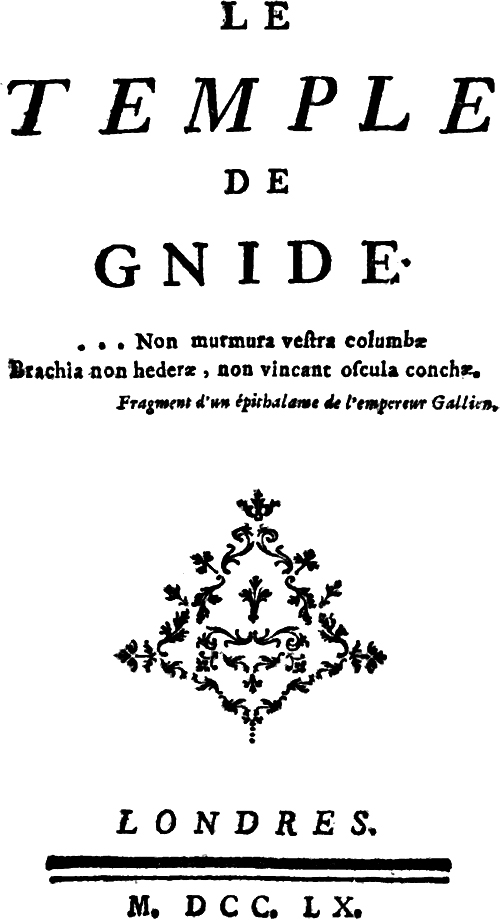Montesquieu, Charles de Secondat, baron de. "The Temple of Gnidus." Vol. 4 of The Complete Works of M. de Montesquieu. London: T. Evans, 1777.
Excerpt:
An ambassador of France at the Ottoman Porte, known by his taste for literature, having purchased many Greek manuscripts, brought them to France; and, some of them falling into my hands, I found among them the work of which I here give a translation.
Few of the Greek authors have been handed down to us: they have either perished in the ruin of libraries, or by the negligence of the families who have had them in their possession.
We, however, receive from time to time some pieces of these treasures. We have found works even in the tombs of their authors; and, what is much the same, this was discovered among the books of a Greek Bishop.
We know neither the name of the author, nor the time in which he lived. All that we can say of him is, that he was not anterior to Sappho, since he quotes her in his work.
As to my translation, it is a faithful one. The beauties that were not in my author, I supposed, did not deserve the name of beauties; and I have often chosen a less lively manner of expression, in order the better to express his thought.
I have been encouraged to undertake this translation by the success which has attended that of Tasso. He who performed it will not be offended at my having followed his example. He has there distinguished himself in such a manner, as to be under no apprehensions from those whom he has inspired with the warmest spirit of emulation.
This little romance is a kind of picture in which are selected the most agreeable objects. The public will here find smiling images, magnificent descriptions, and ingenuous sentiments.
It has the marks of an original; which has made the critics demand, after what model it was formed. This must greatly inhance its merit, especially as the work is, in other respects, far from being despicable.
Some of the learned have not discovered in it what they term art; and they alledge, that it is not written according to the rules: but if the work has pleased, it is a proof that the heart has not communicated to them all its rules.
A man who attempts a translation, cannot patiently bear that others should not esteem his author as much as he does himself; and I confess that these gentlemen have often filled me with a furious resentment: but I desire them to leave the young men to judge of a book, which, in whatsoever language it was written, was certainly wrote for their use. I intreat them, therefore, not to trouble themselves with their decisions; for none but the heads that are well curled and powdered, can know all the merit of the Temple of Gnidus.
With respect to the fair sex, to whom I owe the few happy moments I can reckon in my life, I heartily wish that this work may please them. I admire them still; and their not being more the subject of my assiduities is a source of regret.
If men of gravity should desire from me a less trifling work, I am able to satisfy them. These thirty years have I laboured at a book of no more than twelve pages, which is to contain all we know of metaphysics, politics, and morality, and all that very great authors have forgotten in the volumes they have published on those sciences.
Online:
Online Library of Liberty
